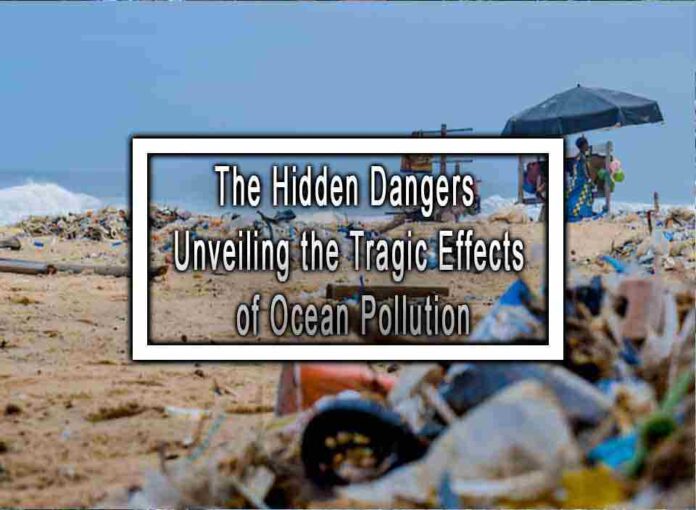Ocean pollution is a pressing environmental issue with severe and often hidden dangers that impact marine life, ecosystems, and human well-being. Various human activities, including industrial waste disposal, agricultural runoff, plastic waste, and oil spills, contribute to the contamination of the oceans. Here are some of the tragic effects of ocean pollution:
1. Threat to Marine Life:
Ocean pollution poses a significant threat to marine life, leading to the entanglement, ingestion, and suffocation of marine animals, such as turtles, whales, and seabirds. Plastic debris, in particular, is often mistaken for food, leading to blockages in their digestive systems and eventual death.
2. Disruption of Ecosystems:
Pollutants in the ocean disrupt marine ecosystems, affecting the balance of aquatic life. The loss of key species can have cascading effects throughout the food chain, leading to a decline in biodiversity and ecosystem degradation.

3. Coral Reef Decline:
Pollution, especially from runoff carrying sediment, agricultural chemicals, and sewage, contributes to the deterioration of coral reefs. Corals are sensitive to changes in water quality, and their decline affects the entire ecosystem, impacting fish populations and coastal protection.
4. Harmful Algal Blooms:
Nutrient pollution from fertilizers and untreated sewage can lead to harmful algal blooms, which release toxins harmful to marine life and humans. These blooms deplete oxygen levels in the water, creating dead zones where most marine organisms cannot survive.
5. Human Health Risks:
Ocean pollution poses health risks to humans who consume contaminated seafood. Toxins, heavy metals, and microplastics can accumulate in the tissues of fish and shellfish, potentially affecting human health if consumed.
6. Economic Impact:
Ocean pollution has significant economic consequences, affecting industries such as fisheries, tourism, and coastal real estate. Declines in fish populations and beach closures due to pollution can result in economic losses for coastal communities.
7. Global Plastic Crisis:
The accumulation of plastic debris in the oceans is a global crisis. It poses threats to marine life, damages ecosystems, and persists for hundreds of years, fragmenting into microplastics that are pervasive throughout the marine environment.
Addressing ocean pollution requires concerted efforts at the individual, local, national, and global levels. Reducing plastic waste, improving waste management and recycling, implementing stricter regulations on industrial and agricultural waste disposal, and promoting sustainable fishing practices are crucial steps to combat this pressing environmental issue. By safeguarding the health of the oceans, we protect the rich biodiversity, natural resources, and life-supporting services they provide to the planet and its inhabitants.











